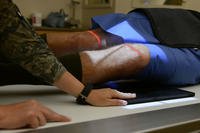The U.S. military has been carrying out experiments on animals in an effort to replicate the symptoms caused by the mysterious "Havana Syndrome," according to a new report.
The Pentagon has been exposing primates to pulsed radio frequency waves to see if that could be the cause of the unexplained ailment that has sickened scores of U.S. government personnel over the past few years, Politico reported on Thursday. The new report comes days after the outlet reported that the Department of Defense was continuing to test weapon systems in an attempt to recreate Havana Syndrome symptoms after an intelligence community dismissed the theory that a foreign adversary or energy weapon was to blame.
Radio frequency waves have also been tested on ferrets because they have similar brains as people, the report said. These experiments have been taking place at Michigan's Wayne State University, which was awarded a $750,000 grant in September for a program with the description: "Traumatic brain injury and psychological health research."
A defense official told Insider that the Department of Defense, in accordance with congressional requirements, "continues to address the challenges posed by" anomalous health incidents, "including the causation, attribution, mitigation, identification, and treatment for such incidents. Our foremost concern remains providing care to affected individuals — since the health and wellbeing of our personnel are our top priority."
The official did not comment on the reported testing on primates but said that the testing at Wayne State University is aimed at alleviating "the deficits associated with traumatic brain injury."
"Weapon-wounding tests on dogs, cats, monkeys, and marine animals are a bloody stain on the uniform worn by those who bravely serve," Shalin Gala, vice president of the animal rights group People for the Ethical Treatment of Animals (PETA), said in a statement shared with Insider. "They do nothing to advance human health, and the US Army should rescind its order allowing such abhorrent tests immediately."
Details of the experiments comes a little over a week after the Office of the Director of National Intelligence determined that the anomalous health incidents — also known as "Havana Syndrome" — were likely not caused by a foreign adversary or an energy weapon, driving a wedge through a disputed theory that US officials were being targeted.
Hundreds of US government personnel, from diplomats to spies, operating around the world have reported experiencing a mysterious sickness with symptoms that include vertigo, memory loss, nausea, and headaches in recent years. The CIA had determined in January 2022 that the incidents — which impacted individuals in countries like Cuba, China, and Russia — were unlikely a deliberate attack from foreign agents.
Director of National Intelligence Avril Haines said in a March 1 statement that the intelligence community agencies "assess that symptoms reported by US personnel were probably the result of factors that did not involve a foreign adversary, such as preexisting conditions, conventional illnesses, and environmental factors."
"Needless to say, these findings do not call into question the very real experiences and symptoms that our colleagues and their family members have reported," she added.













